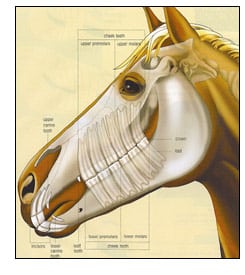
The teeth in the front of the mouth (incisors) clip the grass; the teeth in the back of the mouth (premolars and molars) chew it up!
Horse owners have been inundated with information about their horse’s teeth. According to the magazines, blogs, and websites, not self-respecting horse should ever consider running/jumping/eating/piaffing (or whatever) without first having had it’s teeth evaluated, and, mostly likely, smoothed out and leveled (“floated” – when cement is poured, and then rubbed with a trowel to make smooth, it’s called “floating” cement).
This obsession with the horse’s mouth being smooth is actually a pretty new thing. In fact, in a book that I republished from 1687 (Snape’s Anatomy of An Horse – it’s out of print, but it’s really cool, and not hard to find), Snape, “farrier” to King Charles II discussed how important it was for the horse’s teeth to be really *sharp.* As everybody apparently knew at the time, smooth millstones don’t grind grain well, so you wanted to make sure that the horse’s teeth were sharp, so it could grind its grain. Of course, now, dental enthusiasts would have you believe that any little point or bump could result in the imminent demise of the horse’s well-being, athletic capabilities, posture, ability to chew, or worse – ALL OF THEM!!! Better call the dentist!
Somewhere along the way (starting mostly in the early ’90s), the concept of a “dentist” got to be in vogue in the horse world. That is, the idea came to be that taking care of horse teeth required a “specialist.” This idea was mostly promoted by a group of lay people, with no formal training, who advertised their “trade” based on ideas such as that veterinarians don’t like to take care of horse teeth, can’t do it, or don’t do a good job. Subsequently, a few veterinarians decided to only take care of horse teeth, and the race to work inside the horse’s mouth was on.
When you go to the dentist, you know who you are going to see? You are going to see someone who has had at least three years of schooling past college. You’re going to see someone who participates in a field in which there is scientific research in support of his or her practices. You’re going to see someone who provides necessary services. You’re going to see someone who is licensed, and trained. A dentist, after all, is a member of a well-established profession.
Not the same with horses. Imagine how you’d feel if you found out that your dentist had the same level of training as the person who works at the fast food restaurant around the corner! That’s the case with many of the non-veterinary tooth floaters – they’ve got their idea of how the horse’s mouth should be filed (a procedure, which, fortunately, is generally harmless, as long as it’s not overdone), and the go with it, promoting themselves by saying things like veterinarians don’t like to work on teeth, or don’t know how, or some other equally false statement.
And, while hiring a veterinary “dentist” may provide you some level of liability protection (at lease veterinarians are licensed, and insured), the fact is that we don’t really have much good evidence at all to support the idea that the horse’s mouth needs regular care (along the lines of the human mouth). The idea that the horse’s teeth need to be precisely balanced, and examined a couple of times a year, is advertising fantasy, but not supported by fact. In fact, there’s no study that supports the idea that horse teeth need to regularly be ground down – not for performance reasons, and not for feed efficiency reasons – and certainly no reason to believe that such work has to be done by a self-proclaimed “specialist.”
I completely get the idea that people want the best care for their horse. For better or worse, many horse owners have now been indoctrinated into the belief that, when it comes to teeth, more is better. Plus, when you ask someone who only works on teeth if YOUR horse’s teeth need work, the answer seems to be, invariably, “Yes.” When the only tool that you have is a hammer, pretty soon everything starts to look like a nail.
I’m happy to take a look at your horse’s mouth and see if the teeth are sharp (any good veterinarian should be able to do this). If need be, I can get them level and smooth (after all, I have attended dental seminars, to make sure that I understand the current vogue). But often, I’m happy to say, “No, let’s wait for a while.” There’s no reason to do something that’s not necessary. And there’s no reason to ask some sort of a self-proclaimed specialist to take care of what is (or at least should be) a relatively straight-forward job for your veterinarian.
ALSO CHECK OUT –
A Few Thoughts on “Equine Dentists”

